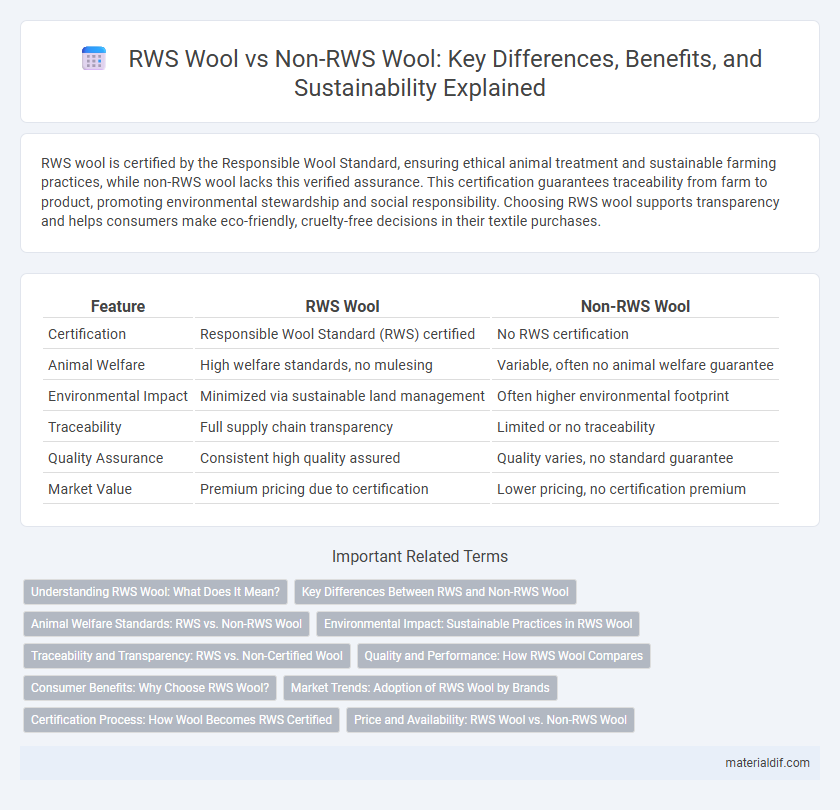RWS wool is certified by the Responsible Wool Standard, ensuring ethical animal treatment and sustainable farming practices, while non-RWS wool lacks this verified assurance. This certification guarantees traceability from farm to product, promoting environmental stewardship and social responsibility. Choosing RWS wool supports transparency and helps consumers make eco-friendly, cruelty-free decisions in their textile purchases.
Table of Comparison
| Feature | RWS Wool | Non-RWS Wool |
|---|---|---|
| Certification | Responsible Wool Standard (RWS) certified | No RWS certification |
| Animal Welfare | High welfare standards, no mulesing | Variable, often no animal welfare guarantee |
| Environmental Impact | Minimized via sustainable land management | Often higher environmental footprint |
| Traceability | Full supply chain transparency | Limited or no traceability |
| Quality Assurance | Consistent high quality assured | Quality varies, no standard guarantee |
| Market Value | Premium pricing due to certification | Lower pricing, no certification premium |
Understanding RWS Wool: What Does It Mean?
RWS wool, certified by the Responsible Wool Standard, ensures ethical sourcing by promoting animal welfare and sustainable land management in wool production. Non-RWS wool lacks this certification, which means it may not adhere to strict guidelines regarding sheep care or environmental impact. Understanding RWS wool involves recognizing its rigorous auditing processes that guarantee traceability and transparency in the wool supply chain.
Key Differences Between RWS and Non-RWS Wool
RWS wool is certified by the Responsible Wool Standard, ensuring ethical sheep welfare and sustainable land management, whereas non-RWS wool lacks this verified guarantee. RWS wool production involves strict animal welfare practices and traceability throughout the supply chain, promoting environmental sustainability. Non-RWS wool may vary widely in quality and sustainability standards, often lacking transparency in its sourcing and farming practices.
Animal Welfare Standards: RWS vs. Non-RWS Wool
RWS wool guarantees strict animal welfare standards including non-mulesing, humane handling, and proper pasture management, ensuring sheep well-being throughout the supply chain. Non-RWS wool often lacks verified compliance, exposing animals to potential mistreatment and unethical practices. Choosing RWS wool supports ethical sourcing and promotes industry transparency in animal care.
Environmental Impact: Sustainable Practices in RWS Wool
RWS wool, certified by the Responsible Wool Standard, ensures sustainable practices that minimize environmental impact through responsible land management and animal welfare. Non-RWS wool often lacks these rigorous standards, leading to greater risks of soil degradation, biodiversity loss, and unethical treatment of sheep. The RWS certification promotes transparency and traceability, encouraging eco-friendly farming and reducing the carbon footprint associated with wool production.
Traceability and Transparency: RWS vs. Non-Certified Wool
RWS wool guarantees full traceability and transparency through strict auditing and certification standards that track the wool from farm to finished product, ensuring animal welfare and sustainable practices. Non-certified wool lacks this comprehensive traceability, making it difficult to verify ethical sourcing and environmental impacts. Brands and consumers demanding accountability favor RWS wool for its verifiable supply chain integrity and sustainability commitments.
Quality and Performance: How RWS Wool Compares
RWS wool, certified by the Responsible Wool Standard, ensures high-quality fibers sourced from farms with strict animal welfare and environmental criteria, leading to superior softness, durability, and breathability. Non-RWS wool may lack consistent traceability and sustainability practices, resulting in variable quality and potential ethical concerns. The adherence to RWS standards directly enhances the wool's performance in garments by maintaining fiber integrity and reducing contaminants.
Consumer Benefits: Why Choose RWS Wool?
RWS wool guarantees ethical sourcing by adhering to strict animal welfare and environmental standards, ensuring consumers support sustainable farming practices. This certification enhances product quality through traceability, providing transparency from farm to final garment. Choosing RWS wool means investing in eco-friendly, cruelty-free clothing that promotes responsible animal treatment and reduces carbon footprints.
Market Trends: Adoption of RWS Wool by Brands
The market for Responsible Wool Standard (RWS) wool is expanding rapidly as major fashion brands integrate sustainable sourcing into their supply chains, driven by consumer demand for ethical products. RWS wool ensures animal welfare and land management compliance, which distinguishes it from non-RWS wool and enhances brand reputation in competitive markets. Sustainability reports from leading apparel companies reveal a measurable increase in RWS wool adoption, reflecting broader industry commitments to transparency and environmental responsibility.
Certification Process: How Wool Becomes RWS Certified
RWS wool undergoes a stringent certification process involving independent audits that verify animal welfare, land management, and social responsibility standards from farm to finished product. Non-RWS wool lacks this comprehensive traceability and assurance, often resulting in less transparency regarding ethical and environmental practices. The RWS certification ensures compliance with globally recognized criteria, providing consumers with verified sustainable and humane wool products.
Price and Availability: RWS Wool vs. Non-RWS Wool
RWS wool typically commands a higher price due to the rigorous certification process ensuring ethical and sustainable farming practices, which can limit its availability compared to non-RWS wool. Non-RWS wool is generally more accessible and cost-effective but lacks the guarantee of responsible sourcing and environmental standards. Buyers seeking sustainability often accept the premium and potential scarcity associated with RWS wool for its verified ethical benefits.
RWS wool vs Non-RWS wool Infographic

 materialdif.com
materialdif.com